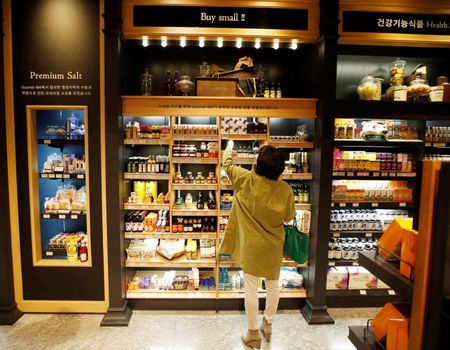By Sohee Kim and Joyce Lee
SEOUL (Reuters) - As South Korea's population rapidly ages, makers of consumer goods from washing machines to packaged foods and pet products are increasingly targeting people like Lee Dong-soo, who is 34 and lives alone with his cat.
Spending by so-called "golden singles" - young unmarrieds living alone - who splash out more on food and other goods, is a bright spot for an economy plagued by sluggish consumer demand that has lagged overall growth for most of the past two years.
"Compared with married friends, I spend considerable money on food, shopping and dabbling in new hobbies," said Lee, a professional singer living in Seoul's trendy Gangnam district.
The South Korean population is the world's fastest-aging, and younger people are getting married later or not at all. The average age of first-time marriages last year was 32.2 for men and 29.6 for women, up from 27.8 and 24.8 in 1990.
Similar demographic trends have been taking place in many developed nations, but they have been particularly rapid in Asia's fourth largest economy, whose companies are proving to be creative in their response.
To woo consumers like Lee, Samsung Electronics in August launched a "Slim Style" refrigerator that is narrower and taller than ordinary fridges and is "optimised for the lifestyle of single-person households", said Koo-yeun Choi, a Samsung senior vice president.
CJ Cheiljedang Corp, South Korea's largest food manufacturer, is expanding a singles-focused marketing strategy launched last year for its prepared foods business.
"We hold promotion events and open cooking classes for singletons, especially to office workers and college students," said Kim Tai-joon, CJ Cheiljedang's executive vice president.
One-person households in South Korea made up 25.3 percent of the total in 2012, a share that is on track to grow to 34.3 percent in 2035, according to Statistics Korea.
South Korea is undergoing a demographic shift similar to that experienced in recent years by Japan, where the share of one-person households reached 31.5 percent in 2011, up from 27.9 percent 10 years earlier, according to Euromonitor.
The Korea Institute for Industrial Economics and Trade expects the spending power of single-person households to reach $113 billion (70.6 billion pounds) by 2020, doubling from 2010.
MEALS FOR ONE
LG Electronics and Dongbu Daewoo Electronics Corp have been actively targeting single-person households since last year, with solo-friendly home appliances such as small-load washing machines, robot vacuum cleaners and portable TVs.
The market for packaged, ready-made and predominantly single-portion meals was valued at about 3 trillion won ($2.9 billion) in 2013 and is expected to grow 15 percent this year, said Baek Woon-mok, a retail sector analyst at Daewoo Securities.
The monthly average consumer expenditure of one-person households stood at 973,700 won in 2012, compared to 847,300 won per person for two-person households, in the latest available official figure from Statistics Korea.
"While the consumer goods market in South Korea is in a slump, the uncharted market for minimised electronics, packaged premium foods and handy distribution stores has only begun to respond," said Nam Ok-jin, consumer sector analyst at Samsung Securities.
Consumer spending accounts for just over half of South Korea's $1.3 trillion economy.
Makers of mid-priced cosmetics, such as Amorepacific Corp and Cosmax Inc, are poised to gain as the share of women living alone grows, while the leisure, travel and beauty industries are also beneficiaries of the growing share of young people living in solo households, Nam said.
Even the pet industry is doing increasingly brisk business as Korean singles splash out on the dogs and cats they treat as surrogate family members. South Korea's pet industry is poised grow from 1 trillion won in 2013 to 6 trillion won in 2020, a report by the Nonghyup Economic Research Institute predicts.
"In the past, it was rare for South Koreans to spend money on pet services such as pet walking and pet kindergarten. However, the increase in single households is expanding spending on pets," said Han Chi-soo, president of the Korea Pet Shop Club, an industry group.
While many Korean still view getting married and raising families as priorities, a growing number, like Lee, are in no hurry.
"Marriage means another debt for me now," he said. "I want to enjoy this luxurious period of my life for a while."

(1 US dollar = 1,048.9700 Korean won)
(Editing by Tony Munroe and Alex Richardson)
